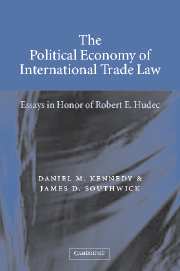Book contents
- Frontmatter
- Contents
- List of contributors
- Preface
- Foreword by E. THOMAS SULLIVAN
- Introduction: An overview of the volume
- Part I The constitutional developments of international trade law
- 1 Sovereignty, subsidiarity, and separation of powers: The high-wire balancing act of globalization
- 2 Constitutionalism and WTO law: From a state-centered approach towards a human rights approach in international economic law
- 3 WTO decision-making: Is it reformable?
- 4 Some institutional issues presently before the WTO
- 5 Domestic regulation and international trade: Where's the race? Lessons from telecommunications and export controls
- Part II The scope of international trade law: Adding new subjects and restructuring old ones
- Part III Legal relations between developed and developing countries
- Part IV The operation of the WTO dispute settlement procedure
- Bibliography of works by ROBERT E. HUDEC
- Index
2 - Constitutionalism and WTO law: From a state-centered approach towards a human rights approach in international economic law
Published online by Cambridge University Press: 02 September 2009
- Frontmatter
- Contents
- List of contributors
- Preface
- Foreword by E. THOMAS SULLIVAN
- Introduction: An overview of the volume
- Part I The constitutional developments of international trade law
- 1 Sovereignty, subsidiarity, and separation of powers: The high-wire balancing act of globalization
- 2 Constitutionalism and WTO law: From a state-centered approach towards a human rights approach in international economic law
- 3 WTO decision-making: Is it reformable?
- 4 Some institutional issues presently before the WTO
- 5 Domestic regulation and international trade: Where's the race? Lessons from telecommunications and export controls
- Part II The scope of international trade law: Adding new subjects and restructuring old ones
- Part III Legal relations between developed and developing countries
- Part IV The operation of the WTO dispute settlement procedure
- Bibliography of works by ROBERT E. HUDEC
- Index
Summary
“Transcending the ostensible”: constitutional democracy and World Trade Law
The General Agreement on Tariffs and Trade (GATT) was negotiated as an agreement about rights and obligations of states and of other “customs territories” in 1947, i.e., at a time when human rights were not yet recognized as part of general international law. Today, more than fifty years later, human rights have become recognized by virtually all 189 United Nations (UN) member states as part of general international law and, in part, of international ius cogens. This “human rights revolution” and the customary rules of international treaty interpretation (as reflected in Article 31 of the 1969 Vienna Convention on the Law of Treaties) require interpretation of the 1994 Agreement establishing the World Trade Organization (WTO) with due regard to “any relevant rules of international law applicable in the relations between the parties” (Article 31:3(c) Vienna Convention), including universally recognized human rights. What are the legal consequences of this “paradigm change” from a state-centered approach towards a human rights approach in international law for the interpretation and progressive development of WTO law? Does it matter, for instance, for the interpretation of the WTO Agreement on Trade-Related Intellectual Property Rights (TRIPS) that UN human rights instruments recognize intellectual property and the right of everyone to benefit from the protection of intellectual property as human rights?
- Type
- Chapter
- Information
- The Political Economy of International Trade LawEssays in Honor of Robert E. Hudec, pp. 32 - 67Publisher: Cambridge University PressPrint publication year: 2002
- 10
- Cited by



